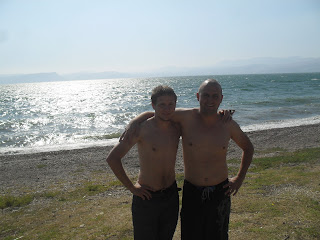I always wanted to be in the army,
but there was an obstacle in my way: my parents. They didn’t think it was a
right choice for me so they strongly disagree with my decision of joining the
United States Army. In the end I didn’t join because I wanted to honor my
parents’ wishes. I might neve];r join the army but I got the chance to
experience the combat level of being in it from the Israel perspective.
I got the chance to paintball at
Caliber 3, a counter-terrorism training academy in the West Bank. Caliber 3
works closely with the Israel Defense Forces (IDF) in the field of
counter-terrorism. In America, paintballing is considered a game or a sport
while having the illusion you’re in the military. In Caliber 3, it was a whole
different experience. I got the chance to learn how to clear a house of an
enemy and the ready position- so you could snap into combat mode in less than
three seconds. When we got the chance to actually play paintball I felt my
adrenaline kick in and I was ready for battle. I wanted to win every game
because this would be the closest I would get to being in combat. Even though
we were wearing protective gear I got shot on my left thigh. The irony of it is
that I have an AK-47 tattoo on my thigh which is a symbol for my desire to join
the army and I got shot right next to it. For me, that shot was filled with a
bullet instead of paint. To me that wasn’t a paintball shot by a member of the
other team but an actual bullet by a terrorist.
The Caliber is a very important
resource for Israel because it not only does it train top elite solider but help
civilians understand how the Israeli army go out to the enemy land and make
sure there are no civilian casualties and get the job done in an efficient way.
I am glad that something like Caliber 3 exists so people like me can experience
and learn the combat zone.







